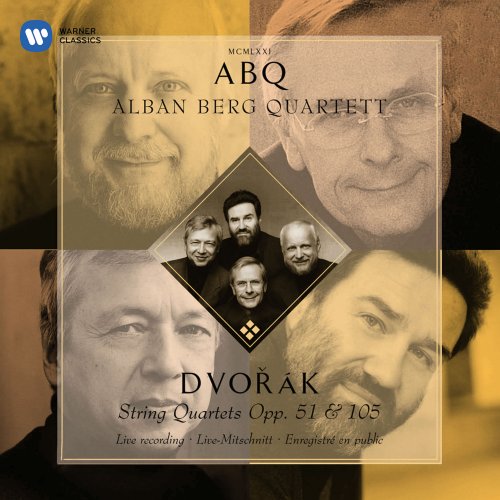
Alban Berg Quartett - Dvorák: String Quartets, Op. 51 & 105 (2005)
BAND/ARTIST: Alban Berg Quartett
- Title: Dvorák: String Quartets, Op. 51 & 105
- Year Of Release: 2005
- Label: EMI Classics
- Genre: Classical
- Quality: FLAC (tracks)
- Total Time: 01:00:55
- Total Size: 303 mb
- WebSite: Album Preview
Tracklist:
String Quartet No. 10 in E flat major, B. 92 (Op. 51)
1. I: Allegro Non Troppo
2. II: Dumka (Elegia). Andante Con Moto - Vivace
3. III: Romanze. Andante Con Moto
4. IV: Allegro Assai
String Quartet No. 14 in A flat major, B. 193 (Op. 105)
5. I: Adagio Ma Non Troppo - Allegro Appassionato
6. II: Molto Vivace
7. III: Lento E Molto Cantabile
8. IV: Allegro Non Tanto
Performers:
Alban Berg Quartett
String Quartet No. 10 in E flat major, B. 92 (Op. 51)
1. I: Allegro Non Troppo
2. II: Dumka (Elegia). Andante Con Moto - Vivace
3. III: Romanze. Andante Con Moto
4. IV: Allegro Assai
String Quartet No. 14 in A flat major, B. 193 (Op. 105)
5. I: Adagio Ma Non Troppo - Allegro Appassionato
6. II: Molto Vivace
7. III: Lento E Molto Cantabile
8. IV: Allegro Non Tanto
Performers:
Alban Berg Quartett
When released in 2001, these live performances of two Dvorak quartets caught the ABQ at their best (in concert from 1999). Quartet no. 10 in particular is a miracle of supple ensemble in which the smallest nuances of tone and phrasing are uncannily shared by each musician. This reading comes as close as imaginable to a string quartet sounding like a single great musician. Compared to performances by native Czech groups, the ABQ's Dvorak is urbane, subtle, and poised. Don't expect earthiness or rustic atmosphere. It's a critical cliche to prefer Czech ensembles over the ABQ -- the Gramophone even went so far as to prefer (what else?) their favorite British quartet, the Lindsays. However that may be, any lover of string quartet playing should hear what the ABQ were like at their peak -- incomparable.
Although he wrote 14 string quartets, Dvorak's complete output is rarely heard in concert halls outside Czechoslovakia. After the famous and nearly ubiquitous Quartet no. 12, the "American," one of the most tuneful and cheerily accessible is no. 10. Dvorak was essentially a melodist and an optimist, so none of the quartets are tragically inclined. The last, no. 14, was written in 1895-96, bridging Dvorak's stay in America and his return to Bohemia. He was about to embrak on purely orchestral work, primarily the four late tone poems, so this is a significant work. It doesn't feel like a final statement or a summation of what came before. I find it another sunny work with a bit more ambition in terms of counterpoint and development. As vast as my admiration for the ABQ is, they seem a bit too aggressive in the opening movement. Otherwise, both readings reach the same impressive pinnacle, and EMI's close-up sound captures them with visceral impact.
Although he wrote 14 string quartets, Dvorak's complete output is rarely heard in concert halls outside Czechoslovakia. After the famous and nearly ubiquitous Quartet no. 12, the "American," one of the most tuneful and cheerily accessible is no. 10. Dvorak was essentially a melodist and an optimist, so none of the quartets are tragically inclined. The last, no. 14, was written in 1895-96, bridging Dvorak's stay in America and his return to Bohemia. He was about to embrak on purely orchestral work, primarily the four late tone poems, so this is a significant work. It doesn't feel like a final statement or a summation of what came before. I find it another sunny work with a bit more ambition in terms of counterpoint and development. As vast as my admiration for the ABQ is, they seem a bit too aggressive in the opening movement. Otherwise, both readings reach the same impressive pinnacle, and EMI's close-up sound captures them with visceral impact.
DOWNLOAD FROM ISRA.CLOUD
Alban Berg Quartett - Dvorák String Quartets, Op. 51 & 105 (2005).rar - 303.6 MB
Alban Berg Quartett - Dvorák String Quartets, Op. 51 & 105 (2005).rar - 303.6 MB
As a ISRA.CLOUD's PREMIUM member you will have the following benefits:
- Unlimited high speed downloads
- Download directly without waiting time
- Unlimited parallel downloads
- Support for download accelerators
- No advertising
- Resume broken downloads


